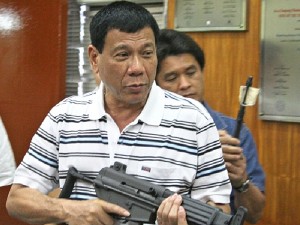DAVAO CITY, Philippines—Mayor Rodrigo Duterte disclosed on Monday that the US government had asked him for permission to use this city’s old airport as base for launching unmanned aerial vehicles or drones used in the campaign against terrorists.
“The US government wants to use the old airport. I refused. I will not allow them to use our airport to launch their drones,” Duterte said at a gathering of 150 Muslim volunteers who would help secure the city against terrorists.
Duterte said the Americans had been asking to use the airport for drone operations since his daughter, Sara Duterte, was the mayor of Davao City.
“I do not want it. I do not want trouble and killings,” Duterte said.
He said he had told the US government that there would only be more bloodshed if he allowed the deployment of drones from his city.
“They will only add to the problem,” Duterte said.
Only if requested
But the US Embassy in Manila said on Thursday that the US military deployed drones only to assist in aerial surveillance for humanitarian and search and rescue operations, and only on the request of the Philippine government.
“At the request of the Philippine government, the US military has provided aerial surveillance using small unarmed, unmanned aerial vehicles (UAVs) to support activities such as topographical analysis and safety estimates,” the US Embassy said in a statement.
The embassy did not directly comment on Duterte’s remarks, but said drone operations had been limited to providing aerial reconnaissance during humanitarian emergencies or urgent search and rescue missions.
Deployments included support for an aerial survey of the devastation wrought by Typhoon “Pablo” in Mindanao in December last year. The typhoon destroyed entire villages and killed more than 1,100 people on the island as Filipinos were preparing for Christmas festivities.
Drones were also dispatched to scan the waters off Masbate in support of the search and retrieval operations for the light plane that carried Interior Secretary Jesse Robredo and crashed there a year ago.
“When requested by the AFP (Armed Forces of the Philippines), the US military provides aerial surveillance assistance to support the AFP. For example, such information has helped the Philippines safely perform missions such as humanitarian assistance in the case of floods or other natural disasters, or rescue and recovery operations,” the US Embassy said.
US access plan
Duterte disclosed the supposed US request as Philippine and US officials began negotiations for increased US access to military bases in the Philippines.
The greater access plan is unpopular, and has aroused suspicions in the Senate, which voted to expel US military bases from the Philippines in 1991.
But the Aquino administration defends the plan as necessary to counter China’s increasingly aggressive assertion of its territorial claims in the West Philippine Sea (South China Sea) and to enhance the capabilities of the Philippine military.
Philippine defense and foreign affairs officials have sought to assure the public that any increased access agreement that will be reached with the Americans will be in accord with the Constitution and US-Philippine cooperation pacts.
Earlier this month, Foreign Secretary Albert del Rosario confirmed that the United States had been providing intelligence assistance to the Philippines through the deployment of P-3C Orions (maritime surveillance aircraft) over territories disputed by the Philippines and China in the West Philippine Sea.
The deployments were part of joint US-Philippine military exercises, Del Rosario said.
US covert operations
In 2011, Duterte said he believed the United States was carrying out covert operations against Muslims in Mindanao.
Duterte mentioned the explosion in a hotel in the city on May 16, 2002, where American Michael Meiring was injured.
He said investigation of the incident pointed to Meiring as the owner of the bomb.
Meiring was taken to a hospital and treated under tight security, Duterte said, but Americans believed to be Federal Bureau of Investigation agents smuggled Meiring out of the hospital and took him back to the United States via Singapore.
Duterte said he believed Meiring and the explosion were linked to US covert operations in Mindanao.
Duterte said he remained open to talks with the United States, but added that he would consistently reject requests that had to do with covert operations.
Left pleased
Duterte’s stance pleased the Mindanao chapter of the left-leaning Bagong Alyansang Makabayan (Bayan).
“We commend and firmly support the decision of the mayor not to allow drone operations in the city,” said Sheena Duazo, Bayan spokesperson.
“The use of [drones] is a clear violation of our national sovereignty,” she said.
“The problem with US drones is that they can be used for surveillance and they can be used for actual combat operations. This is due to the proposed access agreement that will allow US troops to be present all over the country, including Davao City,” she said.
Duazo said Duterte’s information might shed light on the recent spate of bombings in Mindanao.
“With what has been divulged by the mayor right now we can now connect and say that the recent bombings have a connection with what the US-Aquino regime is planning—to justify the plan to deploy more US troops, especially here in Mindanao,” Duazo said.
